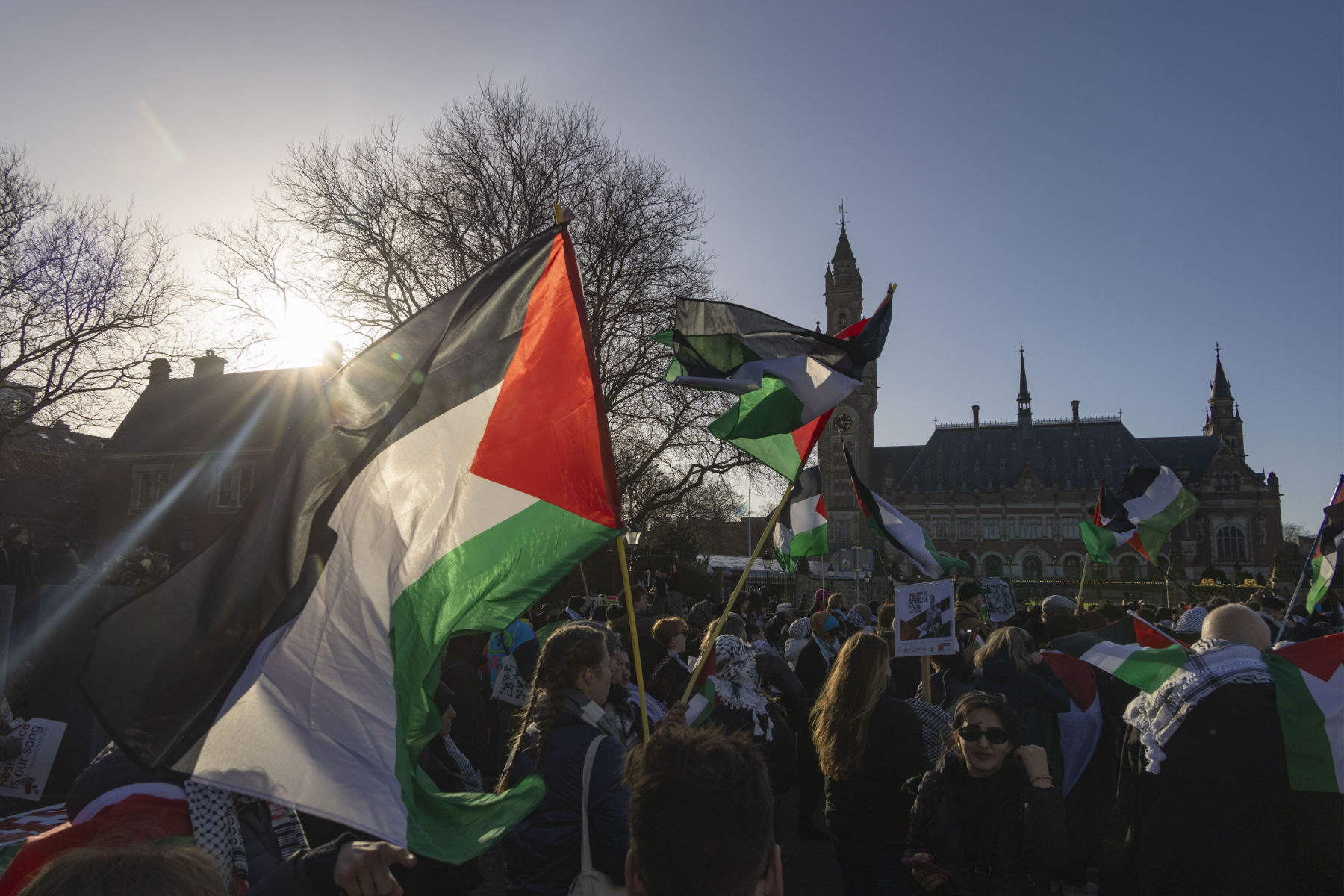Those in the U.S. foreign policy community concerned with human rights, including civil society actors and members of Congress, have long urged the U.S. government to "condition" military or economic aid or weapons transfers to abusive governments in the Middle East and North Africa on reforms or improvements in their human rights record.
Human rights organizations think tanks, academics and commentators routinely call on the U.S. government to pressure an abusive MENA government it supports to make reforms, including most typically releasing prisoners, but also, for example, strengthening the rule of law or democratic institutions, ending torture, and investigating and prosecuting abusive security officials. They also urge the United States to threaten the abusive government with a loss of U.S. support if they fail to make such reforms.
The mechanisms for this "conditionality" typically involve legislative restrictions in defense or foreign assistance appropriation bills. For example, the 2021 Appropriations Act conditions certain portions of U.S. military and economic aid to Egypt on the State Department's certification that Egypt is:
taking sustained and effective steps to — (i) strengthen the rule of law, democratic institutions, and human rights in Egypt, including to protect religious minorities and the rights of women, which are in addition to steps taken during the previous calendar year for such purposes; (ii) implement reforms that protect freedoms of expression, association, and peaceful assembly, including the ability of civil society organizations, human rights defenders, and the media to function without interference; (iii) hold Egyptian security forces accountable, including officers credibly alleged to have violated human rights; (iv) investigate and prosecute cases of extrajudicial killings and forced disappearances; and (v) provide regular access for United States officials to monitor such assistance in areas where the assistance is used.
The legislation usually exempts certain categories of military assistance from such conditions; for example, the 2021 conditions imposed on military aid to Egypt exempt aid for counterterrorism, border security, and nonproliferation programs. In addition, even conditions without built-in exemptions are permitted to be—and almost always are—waived by the secretary of state pursuant to broad "national security interests" detailed in confidential annexes.
The largest recipients of U.S. economic and military aid in the region have remained consistent over many decades. Israel, currently at $3.7 billion in annual aid and $8 billion in loan guarantees; Egypt at $1.5 billion in aid; and Jordan at $1.5 billion aid, are consistently among the highest U.S. aid recipient governments in the world, and in the case of Israel, vastly exceed aid from any other government.
In practice, it is very rare that the U.S. government implements any human rights conditions to block U.S. support to abusive governments. At best, they can be described as occasional, intermittent threats to withdraw a portion of aid, and these threats are almost never implemented.
There have been some rare instances of a short-term block on certain weapons, for example, certain guided missiles that the Obama administration briefly suspended from delivery to Saudi Arabia in light of its record of gross international humanitarian law violations in Yemen, or its two-year suspension of certain weapons deliveries to Egypt following the coup and the massacre of protesters in Cairo's Rabaa al-Adawiya Square in 2013. In each case, however, the suspensions were lifted, despite persistent abuses and a failure to meet conditions.
Even where implemented, these rare, temporary or permanent suspensions of a portion of U.S. support have had negligible effect on human rights conditions in the abusive government, and have always been overshadowed by an exponentially larger flow of continued U.S. support. That continued U.S. support in the face of small suspensions reaffirms the political message that the U.S. still overwhelmingly supports the abusive government notwithstanding any minor cuts or suspensions in its aid.
Sometimes, the conditionality requirements have led the State Department to make patently false claims about a country's human rights record to avoid the imposition of a weapons ban, such as when Secretary of State John Kerry refused, in 2013, to characterize the Egyptian military takeover of the civilian government as a "coup" and to claim that the new military government was working to "restore democracy" to avoid an automatic suspension of aid required under U.S. law.
Two years later, following incontrovertible, extensively documented abuses by Abdel-Fattah el-Sisi's government, the Department of State admitted to the reality of human rights abuses in Egypt, but invoked the national security waiver to resume U.S. support, as it has done every year since.
More recently, in 2018, Secretary of State Mike Pompeo certified, with respect to the war in Yemen, that Saudi Arabia and the UAE were "undertaking demonstrable actions to reduce the risk of harm to civilians and civilian infrastructure resulting from military operations of these governments," despite overwhelming evidence to the contrary, in order to avoid a ban on U.S. aerial refueling of Saudi and Emirati warplanes.
The largest recipients of U.S. economic and military aid in the region have remained consistent over many decades. Israel, currently at $3.7 billion in annual aid and $8 billion in loan guarantees; Egypt at $1.5 billion in aid; and Jordan at $1.5 billion aid, are consistently among the highest U.S. aid recipient governments in the world, and in the case of Israel, vastly exceed aid from any other government.
The U.S. has also provided 45 percent of the weapons sold to the MENA region between 2000 and 2019, the largest portion of any country. Almost all of the largest purchasers of U.S. weapons in the region have serious records of widespread human rights abuses and are characterized herein as "abusive."
The Harms of Conditionality
The problematic consequences of foreign policy advocacy that perpetuates calls for "conditioning" U.S. assistance or weapons transfers on human rights reforms despite the failed record of such conditionality is multifold:
U.S. government conditionality demands urging an abusive government to improve its record fail to recognize the United States' own human rights obligations not to contribute to, or benefit from, human rights abuses. These obligations require the U.S. to end support for an abusive government because such assistance contributes to the abusive government's political, economic and military capacity to carry out its abuses, at home and/or abroad.
Conditionality recommendations also internalize the assumption that U.S. support can and should continue, and that there are legitimate national interests justifying such support, so long as at least a portion is conditioned on reforms. The formula is "Yes, but…". It also supposes that it is permissible for the U.S. to support an abusive government if it makes certain reforms. But doing so still contradicts the United States' human rights obligations not to contribute to human rights violations by supporting an abusive government.
It is important to note that calling for an end to U.S. support for an abusive government is not primarily intended as a sanction, punishment or means of pressuring the abusive government to curb its abuses. It is unlikely to result in any meaningful and sustained reform in the human rights performance of the abusive government. Rather, it is intended to ensure that the U.S. is complying with its own legal obligations not to contribute to abuses.
Conditionality presumes that "some" support, particularly economic support, to an abusive government may not be harmful, so long as a piece of support is withheld. In reality, however, in authoritarian, centralized governments, there may be virtually no "independent" centers of authority where the U.S. can or is permitted by the abusive government to transfer its support to non-military purposes without contributing to the strength and capacity of the abusive government. In a country like Egypt, there may have been a time when the U.S. could direct economic aid to independent civil society groups or more autonomous government agencies. Today, they have virtually ceased to exist, and the Egyptian government now controls every dollar of economic aid it receives, either directly or through government controlled NGOs. And while direct cash transfers to an impoverished community or education scholarships may authentically help citizens of a country, they are also typically a rare or negligible part of any aid package, and far outweighed by the harms of the much broader package of U.S. support of which they are a very small part.
In addition, as money is fungible, U.S. support is fungible: Each extra dollar of essential U.S. support to an abusive government frees up a dollar of resources for the abusive government to buttress its repressive arsenal, even if the U.S. support does not go directly to that arsenal. The U.S. government occasionally has recognized this fungibility in those rare instances when it sought to condition U.S. support (without impact) to Israel by, for example, in 2003, cutting $289.5 million in loan guarantees equal to the amount Israel had spent on illegal settlements, or in 2020, threatening to cut aid to Israel for an amount equal to the annual cost of its settlements and proposed annexation.
In contrast, the Leahy Laws—two statutory provisions that restrict U.S. military assistance to abusive military units of a foreign government—fail to recognize this fungibility or the centralized nature of authoritarian control. It treats an abusive unit of a government as capable of being isolated from the central government. It is implausible to make such a distinction in a government where abuses are systematic and widespread. Furthermore, the Leahy Laws restrict only abusive conduct by military units, but neglect to withhold aid for systematic, countrywide human rights abuses, such as widespread torture in prisons, or a complicit judicial system that imprisons thousands with a veneer of legal process.
Conditionality perpetuates the unlikely pretense that an abusive government is capable of, or can be pressured to, to significantly reform by virtue of conditions imposed on U.S. support. Governments engaged in systematic and widespread abuses of their population are typically unwilling to undertake significant, structural human rights reforms, particularly for democractic participation, for the simple reason that their survival is predicated on undemocratic, authoritarian rule, and any serious reform threatens their unchallenged hold on power. Especially while U.S. support helps to prop them up, they may be willing to make concessions, for example by releasing some unjustly detained prisoners. But there is no record of conditions on aid leading to broad, structural human rights reforms. Faced with the possibility of losing power or losing aid, they will rationally choose the latter.
While there have been rare instances of abusive governments transitioning to democracy and undertaking significant human rights reforms, such as the Nationalist government of South Africa in the early 1990s, these transitions have not been the product of the U.S. imposing unilateral conditions. There certainly are no examples of abusive MENA governments undertaking significant reforms or otherwise ending systematic and widespread human rights or international humanitarian law abuses when faced with the threat of a cut in U.S. support. It may be argued, hypothetically, that since we have no examples of the U.S. actually suspending or canceling all or a significant portion of U.S. support based on a failure to meet human rights conditions, governments aren't undertaking reforms because they're not taking the withdrawal threat seriously—or that conditionality might work to produce reforms if implemented. A better approach could be to cut U.S. support and see if any reforms ensue.
It's important to note that the significance of U.S. support to abusive governments lies far more, or at least as much, in the political support it reflects, than in the hard dollar value to the military arsenal of the abusive government. For example, U.S. military aid to Egypt and Israel are a small fraction of their annual military budgets. U.S. aid, whether by arms gifts or arms sales, represents a vote in support of the legitimacy and credibility of the abusive government as a responsible actor in the international community.
Conditionality perpetuates the pretense that the U.S. is a benevolent actor interested in human rights reforms that benefit the population of a country and will withhold U.S. support if such abuses continue. The record reflects that this is simply not true. The U.S. has for decades supported abusive governments in the MENA region irrespective of their deplorable rights records, aiding them in carrying out their abuses, ignoring U.S. laws barring arms transfers to abusive governments, waiving any human rights conditions that may exist, or falsely declaring them to be fulfilled. By repeating the conditionality formula as the central demand of the part of the foreign policy community committed to human rights, we perpetuate a mythology of the U.S. government's benevolent concern for human rights, shift the focus away from the United States' own role in contributing to human rights abuses by repressive governments, and avoid addressing the need for accountability for harmful American policies in the region.
Conditionality rewards and encourages hostage-taking. The most typical way a government will choose to demonstrate a modicum of "reform" is by releasing a political prisoner whose case becomes publicized in the Western media. Most U.S. administrations understandably focus on the release of U.S. citizens held by the abusive government, and when they are released, the human rights community celebrates the achievement as a win. Such releases are, however, typically coupled with new arrests, often of other American citizens. Governments realize that such political prisoners are valuable chits to offer up for the next cycle of demands for reform tied to a U.S. aid package. There is thus serious and legitimate concern that conditionality encourages new arrests.
Calls for ending forever wars, returning to a more restrained foreign policy and even "withdrawing" from the Middle East have proliferated among foreign policy commentators on the left and right.
The Case for Ending U.S. Support to Abusive Governments
The appropriate way for the U.S. to fulfil both its international human rights law and domestic law obligations is to end U.S. support for abusive governments engaged in systematic and widespread abuses of human rights and international humanitarian law. As explained, human rights law prohibits a government from contributing to, or benefiting from, human rights abuses. Section 502B of the Foreign Assistance Act also prohibits the executive branch from providing security assistance to foreign governments that have engaged in a "consistent pattern of gross violations of internationally recognized human rights." The law rightly demands that the U.S. avoid being identified with abusive governments through the provision of assistance. Our role in the foreign policy community concerned with human rights should be to seek to enforce these laws.
As explained below, the rationale that U.S. support to abusive MENA governments advances U.S. interests often relies on outdated, unchallenged assertions of U.S interests in the region and speculative, attenuated reasoning about theoretical benefits it secures. In contrast, the harm of such support, and our legal obligations, are concrete and certain. Ending U.S. support may reduce often hypothetical American leverage to make political demands on an abusive government, but in practice, there is limited evidence that such leverage has been effective to extract significant concessions to American demands. In any event, even if there may be leverage, the U.S. should more honestly examine what it and the affected populations gain and lose from withdrawing U.S. support. We should rigorously question unchallenged assertions about U.S. interests in each country that justify continued support of abusive governments in the MENA region, and how legitimate interests can and should be maintained.
In addition, even if there are examples of concrete benefits and so-called "leverage" that U.S. support secures from abusive governments, they should be measured against the harms they cause to U.S. interests and obligations, and the people impacted. In many cases, the U.S. can reap the benefits it seeks from such U.S. support through transactional exchanges that do not contribute, or contribute much less, to its harms.
1- Ending Aid Does Not Mean Ending The Relationship: Ending U.S. support does not mean ending all relations with an abusive government. Defenders of the status quo will typically rely on arguments against ending U.S. support to abusers by citing strategic or security interests that demand a continued relationship with the abuser and warning such support will end the U.S. relationship with them. These arguments assume that the only way for the U.S. to maintain any relationship with the abusive governments is by continuing the existing levels of U.S. support and even increasing them.
To the extent that the U.S. has legitimate security interests in a particular country with an abusive government—for example in counterterrorism cooperation—this is likely to be a mutually shared interest, and the U.S. can continue cooperation in this area, such as intelligence-sharing, without providing U.S. financial or military support to the abusive government.
To the extent the U.S. needs to obtain services from an abusive government, such as preferential access for U.S. Navy ships crossing the Suez Canal in Egypt, it can pay for such preferential access as a premium over what other governments that do not provide military assistance pay. Ad hoc agreements and cooperation provide more flexibility for the U.S. to make individualized determinations of the costs and benefits of the cooperation.
2- Other States Who Fill the Void Don't Obviate U.S. Obligations: Defenders of the status quo will also sometimes tangentially argue that if the U.S. ends support to an abusive government, another state will step in to fill the void, with no improvement in human rights. However, the U.S. has a duty to abide by its legal obligations regardless of the failure of other governments to do so, and ending support to abusive governments is intended to end the United States' own contribution to abuses, not necessarily to end the abuses themselves.
As explained above, there is no evidence of systematically abusive governments that have been capable or willing to reform based on unilateral conditions imposed by the U.S. Furthermore, all abusive governments supported by the U.S. already and increasingly secure a substantial portion of their military arsenal from other sources, including purchase or domestic manufacture.
3- Multilateralist Human Rights Advocacy is Preferable: The demand for the U.S. to end support for abusive governments is not grounded in the argument that ending such support will force the abusive governments to cure their abuses. Just as countrywide U.S. sanctions have failed to have any positive human rights impacts, bans on arms sales designed as a punitive tool would fail, too.
Nor is the U.S. responsible, or a credible and legitimate actor, for fixing the conduct of abusive governments through unilateral levers of punishment or reward. Such monitoring and accountability is better conducted by multilateral institutions, such as the U.N.'s Security Council and Human Rights Council, or regional human rights and intergovernmental bodies. The U.S. is responsible for ending its own human rights abuses, including aiding, assisting and enabling abusive governments that violate human rights law and/or the laws of war.
Calls for ending forever wars, returning to a more restrained foreign policy and even "withdrawing" from the Middle East have proliferated among foreign policy commentators on the left and right. They argue that U.S. interests no longer dictate America's endless interference and policing of the region, and rightly call for a further withdrawal of troops and a "pivot" to somewhere else, or different forms of engagement. Others warn against withdrawal, insisting that the U.S. has given up far too much leverage and control, ceding the stage that it should rightfully control to other actors, in particular, Russia and China.
The reviews of withdrawal, pro and con, rarely acknowledge that U.S. support—separate and apart from the presence of U.S. troops and military engagements—is a lever of control and entanglement that continues unabated, and has even expanded, in recent years. Such U.S. support to governments in the Middle East, including most prominently billions in annual military aid to the systematically abusive governments of Israel, Egypt and Jordan, and tens of billions in military sales to Saudi Arabia, the UAE and Bahrain, among others, keep the U.S. tethered to the misconduct of the abusers in the region and entangled in their conflicts, foreign and domestic. Ending support of abusive governments would have the added benefit of best serving U.S. interests by ending such entanglements that harm our economy, endanger our citizens and sully our reputation and credibility.
Recommendations to the Foreign Policy Community:
1- Examine and enhance your research and policy recommendations to the U.S. government:
— Critically review and examine the outcomes and effectiveness of past policy recommendations to condition U.S. arms transfers, economic aid and diplomatic protection ("U.S. support") to assess whether they have been implemented, and what measurable impact they have had on the behavior of a government engaged in systematic and widespread human rights and/or international humanitarian law violations.
— Ensure that recommendations include research to represent the views of independent voices among communities impacted by the abusive government.
— In public presentations, ensure that any gathering is balanced to include independent voices from impacted communities.
2- Ensure that all reports and writings regarding U.S. policy in the MENA region:
— Critically assess and address the role and impact of U.S. support to abusive governments. If your recommendations assume the continuation of such support, even if premised as conditioned on reforms, explain why such support should continue and the costs and benefits of such support.
— Critically examine the extent to which continued U.S. support to an abusive government helps or hinders the asserted interests, as well as the human rights of the relevant country's population. Verify that continued U.S. support will not harm the rights and interests of the population.
— Include an assessment of U.S. obligations under international human rights law and the laws of war, as well as domestic laws, prohibiting the transfer of arms to abusive governments. Specifically, address and demand U.S. compliance with:
—- International human rights and humanitarian law
—- Section 502B of the Foreign Assistance Act (codified at 22 U.S.C. § 2304(a)–(I))
—- The Leahy Laws, including section 620M of the Foreign Assistance Act of 1961, 22 U.S.C. 2378d, and Section 362 of Title 10 of the U.S. Code
—- Ensure that reports discuss, distinguish and highlight the extent to which an abusive government is democratically elected, representative and accountable to its population—and therefore can fairly be described as capable of acting in the interests of its population.
— Ensure that reports clearly identify that U.S. support is made to a government, and not to the country or its people—that is, "arms transfers to the government of Saudi Arabia" and not "arms transfers to Saudi Arabia"; "protection for the government of Egypt" and not "protection for Egypt"
Appendix:
U.S. Obligations Under Domestic and International Law
Domestic Law
- Section 502B of the Foreign Assistance Act
From Human Rights First, "Walking the Talk, 2021 Blueprints for a Human Rights-Centered U.S. Foreign Policy", Chapter 8: "Overhauling U.S. Security Sector Assistance":
Though little-known and habitually ignored, the U.S. government's most important law related to human rights conditionality is the Foreign Assistance Act's Section 502B (codified at 22 U.S.C. § 2304(a)–(i)).16 Section 502B states that "a principal goal of the foreign policy of the United States shall be to promote the increased observance of internationally recognized human rights by all countries." It goes on to direct the president "to formulate and conduct international security assistance programs of the United States in a manner which will promote and advance human rights and avoid identification of the United States, through such programs, with governments which deny to their people internationally recognized human rights and fundamental freedoms, in violation of international law or in contravention of the policy of the United States as expressed in this section or otherwise."
In keeping with this intent, Section 502B prohibits the executive branch from providing security assistance to foreign governments that have engaged in a "consistent pattern of gross violations of internationally recognized human rights." The president may waive the restriction only if he or she provides Congress with a written certification that "extraordinary circumstances" justify the action.
Additionally, the Secretary of State is obligated to submit an annual report to Congress that details the human rights record of each proposed recipient of security assistance for the following fiscal year—a requirement that has resulted, in part, in the State Department's annual Country Reports on Human Rights Practices, which are frequently referred to as the "Human Rights Reports."
Section 502B establishes a clear, if also non-absolute, expectation that the U.S. government will not provide security assistance to habitual human rights violators. Importantly, the section allows for executive branch discretion in supplying military arms and training when warranted by circumstances deemed extraordinary. Yet in so doing, it implicitly imposes a check in the form of a certification required to be presented to the Speaker of the House and the chair of the Senate Foreign Relations Committee.
On balance, the section makes plain that the provision of weapons and other forms of security assistance to systemic abusers of human rights should be a rare occurrence.
- The "Leahy Laws":
From: State Department Fact Sheet, "About the Leahy Law":
The term "Leahy law" refers to two statutory provisions prohibiting the U.S. Government from using funds for assistance to units of foreign security forces where there is credible information implicating that unit in the commission of gross violations of human rights (GVHR). One statutory provision applies to the State Department and the other applies to the Department of Defense. The State Department Leahy law was made permanent under section 620M of the Foreign Assistance Act of 1961, 22 U.S.C. 2378d. The U.S. government considers torture, extrajudicial killing, enforced disappearance, and rape under color of law as GVHRs when implementing the Leahy law. Incidents are examined on a fact-specific basis. The State Department Leahy law includes an exception permitting resumption of assistance to a unit if the Secretary of State determines and reports to Congress that the government of the country is taking effective steps to bring the responsible members of the security forces unit to justice.
The DoD Leahy law is similar to the State Leahy law. Since 1999, Congress included the DoD Leahy law in its annual appropriations act. The DoD Leahy law is now permanent in Section 362 of Title 10 of the U.S. Code. It requires that DoD-appropriated funds may not be used for any training, equipment, or other assistance for a foreign security force unit if the Secretary of Defense has credible information that such unit has committed a GVHR. The law allows for two exceptions to this restriction. The first in cases where the Secretary of Defense (after consultation with the Secretary of State) determines that the government of that country has taken all necessary corrective steps. This first exception is also known as "remediation." A second exception exists if U.S. equipment or other assistance is necessary to assist in disaster relief operations or other humanitarian or national security emergencies.
International Law
From: Stephen B. Cohen, "Conditioning U.S. Security Assistance on Human Rights Practices":
The international law of human rights poses obligations on governments in the exercise of their domestic sovereignty. Under the Universal Declaration, the United Nations Covenants, the European and Inter-American Conventions, and the Helsinki accords, states have defined and agreed to respect certain basic freedoms of persons within their jurisdiction. 3 These obligations suggest a corresponding duty of one government not to support another engaged in serious violations of internationally recognized human rights. In the world of states, the enforcement of international obligations depends on the recognition and implementation of such a duty. While its contours have yet to be articulated under international law, this duty has already been the subject of domestic American statutes that set forth rules for the Executive's conduct of foreign relations with repressive governments.






































